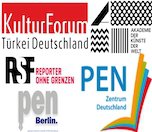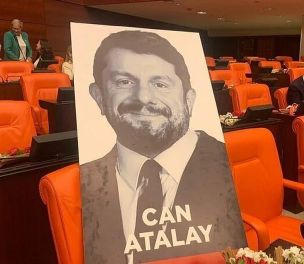Click to read the article in Turkish (1) (2)
In the case of the Gezi Park protests of 2013, the Prosecutor's Office of the Court of Cassation has delivered an opinion for upholding the imprisonment sentences against six suspects who are imprisoned and standing trial, but for the reversal of the sentence against Mücella Yapıcı.
The court has sentenced Osman Kavala to aggravated life imprisonment for an "attempt to overthrow the government," and the six other suspects to 18 years of imprisonment for "helping the attempt to overthrow the government" in the case.
Can Atalay among the six was elected an MP in the elections on May 14, but he was not released from prison to swear and start his term in the parliament.
The applications made for Atalay's release after he obtained MP status are still left unanswered.
The opinion prepared by the prosecutor Zafer Şahin on Friday (July 7) states that the verdicts for Osman Kavala, Ali Hakan Altınay, Çiğdem Mater, Mine Özerden, Yiğit Ali Ekmekçi, Can Atalay and Tayfun Kahraman should be upheld since they acted "in secret," "directed to the same purpose," and "in an organized way." The opinion justifies this on the grounds of the meetings these people held at the time of the Gezi Park protests.
Prosecutor argues that only Yapıcı's verdict should be reversed
However, for Mücella Yapıcı, an architect who served at the Chamber of Architects İstanbul branch starting in 2003 and played a very active role in the struggle to preserve the cultural and historical heritage of the city, the prosecutor's opinion argues for the reversal of the sentence.
The prosecutor states that Yapıcı "was part of the "Taksim Solidarity" which participated in the "organization" created over the Open Society Institute and Anadolu Kültür," but argues that "despite her participation in the demonstrations in the Gezi Park at the very front," there was not competent evidence against Yapıcı and that therefore the verdict against her should be reversed.
Yesterday (July 9) in T24, Murat Sabuncu reported about Mücella Yapıcı's reaction to the prosecutor's opinion which she communicated through her lawyer Fikret İlkiz.
If there is no competent evidence against her, then there is no competent evidence against any one of the suspects, Yapıcı stated.
She said that the opinion that the prosecutor delivered was very surprising to her.
"If there is no adequate, conclusive, or convincing evidence against me, this means there is no conclusive or convincing evidence against the other suspects either," Yapıcı added.
"Gezi case is a whole"
She explained that she found the opinion unethical and why.
"They are saying Mücella Yapıcı is an old person, let us keep her apart so that she will not die in prison. They are afraid that I will cause trouble to them.
"The Gezi case is a whole. And all those who have been convicted have stood trial without any evidence and given prison sentences without convincing evidence," she said.
Gezi Case prisoners
Osman Kavala is a businessperson who was the executive of the Kavala Group since 1982. Kavala is a member of the Turkish Economic and Social Studies Foundation (TESEV) Administrative Board, Open Society Institute Consulting Board, and supporter of the Helsinki Citizens' Assembly, History Foundation, and Diyarbakır Culture House. He is the founder of Anadolu Kültür.
Can Atalay is a lawyer and a human rights advocate, was imprisoned after the Gezi Park trial. He has not been released despite being elected as an MP.
Ali Hakan Altınay is the founding director of the European Policy School, chairperson of the Global Civics Academy, and an executive committee member of Anadolu Kültür.
Çiğdem Mater is a filmmaker, producer, and journalist. She was the executive producer of international projects such as Ai Weiwei's documentary Human Flow (İnsan Seli) and Mohamed Ben Attia's Weldi, the coordinator of Caucasian programs at Anadolü Kültür (2005-2009), the coordinator of Boğaziçi University Alam Film Center (2009-2010), and Turkey coordinator of the Turkey-Armenia Cinema Platform.
Mine Özerden is a documentarist, a human rights and ecosystem defender. She worked for civil society since 2001 and participated in many cultural and art projects, and studies on migrants, women, protection of natural life, etc.
Yiğit Ali Ekmekçi is an economist and activist. He is the founder of the Nesin Foundation and İstanbul Bilgi University and an active member of many non-governmental organizations.
Tayfun Kahraman is a city planner and an academician. He was the chairperson of the City Planners Chamber İstanbul Branch between 2010-2019 and an executive committee member of the chamber headquarters between 2010-2014. Between 2009-2014 he served as a specialist in a protection board under the Ministry of Culture and Tourism.
Mücella Yapıcı is an architect who served at the Chamber of Architects İstanbul branch starting in 2003 and played a very active role in the struggle to preserve the cultural and historical heritage of the city of İstanbul.
(EMK/Mİ/VC/PE)






